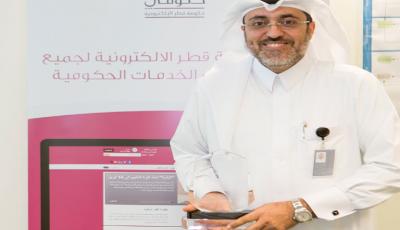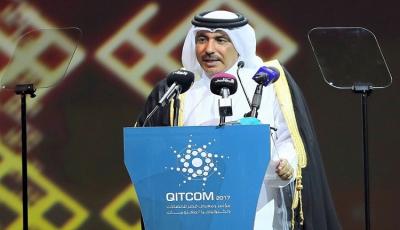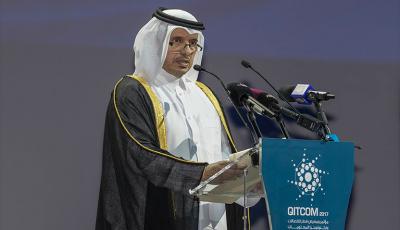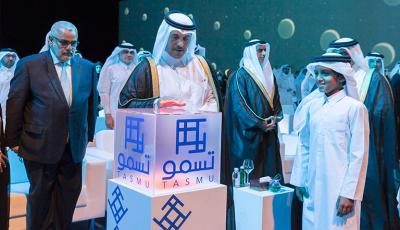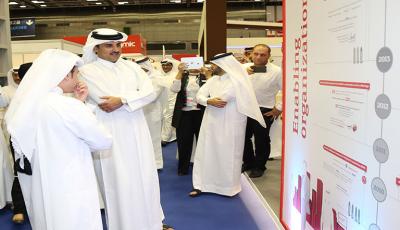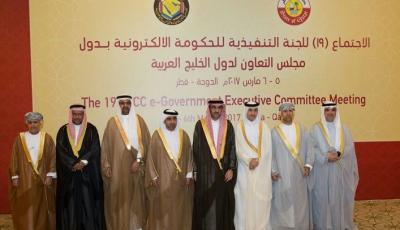Monday, March 6, 2017
PRIME MINISTER OPENS INFORMATION AND COMMUNICATION TECHNOLOGY CONFERENCE
Doha,Under the auspices of HH the Emir Sheikh Tamim bin Hamad Al-Thani, HE Prime Minister and Minister of Interior Sheikh Abdullah bin Nasser bin Khalifa Al-Thani opened on Monday the fourth edition of Qatar's information and communication technology exhibition and conference (QITCOM 2017) at the Qatar National Convention Center (QNCC) in the presence of HE Moroccan Prime Minister Abdelilah Benkirane and UAE Deputy Prime Minister and Minister of the Interior HH Lt. General Sheikh Saif bin Zayed Al Nahyan. Their Excellencies ministers and senior officials were also present along with state guests. At the outset of the opening ceremony, Quran was recited and then a documentary about the event was screened. After that, HE the premier addressed the event, saying that it supports the state's march towards boosting national economy in general and digital economy in particular as the state implements several mega infrastructure projects. Sheikh Abdullah bin Nasser said that developing a knowledge-based digital economy is characterized by diversity and competitiveness, encourages the role of the private sector, and relies on innovation and entrepreneurship as well as the efficient management of environment so as to secure the future of next generations and achieve Qatar National Vision 2030, noting that the communications and information technology sector has a critical role in accomplishing that end and enhances smart solutions in all economic sectors. Under the wise leadership of HH the Emir Sheikh Tamim bin Hamad Al-Thani, HE the prime minister said, the government has made advanced steps in enhancing the basic components of developing the communications and information technology sector by creating the appropriate regulatory and legislative environment for backing the government and private sectors so as to benefit from digital technology in boosting productivity levels and improve competitiveness. He added that the state will continue to work on developing such a vital system of the sector. Sheikh Abdullah bin Nasser bin Khalifa Al-Thani added that the Qatar Smart Program (TASMU) was launched today and is specially designed to accelerate the achievement of all the pillars of the Qatar National Vision 2030. "This program will serve as a platform for the realization of a digital economy and a smart future," HE the prime minister and interior minister said, adding that the state will spare no effort to promote the success of the program by financing the public and private sectors as it plans to spend QR 6 billion over the next five years in order to develop the required technological infrastructure and "activate hundreds of initiatives across many sectors." HE Sheikh Abdullah bin Nasser bin Khalifa Al-Thani said that Qatar Digital Oasis will be established to form a key pillar for cooperation among multinationals, start-ups, small- and medium-sized enterprises, and research institutes, adding that Smart Qatar Program, along with other digital initiatives, will generate a revenue of up to QR 40 billion to the national economy over the next five years as well as accelerate the growth of job opportunities in the communications and information technology sector by 10 percent every year. "There is no doubt that trained human personnel form part of the government's priorities. From this perspective, since 2013, we have been eager to support about 10,000 Qatari specialist trainees during this brief period. The state also launched more than 1,600 electronic services related to all the segments of society," HE Sheikh Abdullah bin Nasser bin Khalifa Al-Thani said. "I refer here to the explicit attention of the state given to people with special needs by providing a legislative environment that guarantees all the rights of this category and integrating them into the modern-era organizations within information technology. "In this context, I cite that, according to the directions of HH the Emir Sheikh Tamim bin Hamad Al-Thani, the MADA center was established as the first specialized center in the Middle East and the second worldwide for people with disabilities, emphasizing our care towards this segment of society and its integration," HE the prime minister and interior minister said, adding that the wise leadership of Qatar believes in the importance of innovative human development. "I also refer to the fact that Qatar Development Bank will continue its support to stimulate innovation and support businesses in the ICT sector in Qatar through the advancement of smart projects. All entities shall cooperate and all efforts shall be unified for the success and achievement of the program's objectives," HE the premier said. HE Sheikh Abdullah bin Nasser bin Khalifa Al-Thani said the government will continue to guarantee the "development of a vital infrastructure for the ICT sector, characterized by innovation, inclusiveness, and security to achieve our vision that Qatar remains a model to be followed on a global level and a platform for innovative technology and entrepreneurs." "I am confident that this conference will encourage entrepreneurship and innovation and will promote the use of smart solutions in our whole society, which will support the sustainable growth and economy prosperity," HE the premier added. After that, the prime minister and interior minister launched the Qatar Smart Program (TASMU), which was specifically designed to accelerate the achievement of the pillars of the Qatar National Vision 2030 and is considered a platform for advancing towards a digital economy and a smart future.
